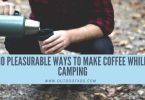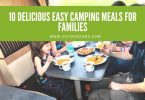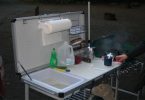We may receive commissions when you buy through the links on our site. Full Disclaimer.
All your life, you have been an enthusiastic camper going all alone in your trails. You got married, and your spouse joined in your adventures too. But now that you have a baby and you are just not ready to give camping up yet. And you want to introduce this child you love to the grandeur of the wilderness as you have experienced it.
So you have given it time, and now your child is about to clock one. And you want to make a camping trip a rite of passage for him/her. You probably think it is impossible, but you can make it happen. All you need is to plan appropriately and be ready to make some adjustments and compromises.
Camping with a one year old is much easier because at this point they are sedentary. So you may take hikes or trips as long as you carry them. Unlike toddlers who you have to watch after while walking to avoid wandering off and getting lost; one-year-olds are great camping companions. You only need some tips and ideas on what to do. The steps you would take should be age-appropriate because your child determines your choices. We can guarantee an exciting trip as long as you follow these helpful tips we have listed out.
READ: 12 Amazing Benefits of Camping with Family
5 Helpful Tips for Camping With A One-Year-Old
1. Proper Planning
Taking a kid of a year or more on a camping trip is not a spontaneous thing to do. Therefore, you need to make research and findings. It helps to read certain books also, get as much knowledge you find. Here are a few things to do;
Find A Purpose
You need to sit and think about what you derive from a camping experience. Is it solitude or bonding? Can you give it up? This is essential to the location of your camping trip. It determines where you will stay and the things to expect at your site. For instance, a family who has a kid and values solitude would likely prefer a space where they can erect a tent. They then opt for a strategy that works well with tents. While another family with kids looking for a getaway time might be more comfortable staying at a motel situated very close to a campsite because of the demands of their infant. It all depends on your choice and purpose.
Select a Suitable Location
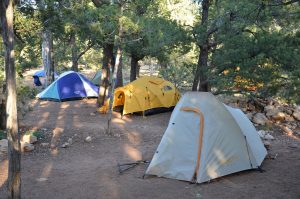
After you have decided on what you need to derive from your trip, it is advisable to pick the location. Now, apart from the sites and all do further research about what specific camps offer, to get a decent idea, you could ask these questions:
- Are the environments baby-friendly?
- Will there be room for pacifying if your baby gets tantrums?
- Can you avoid disturbing other people during their tantrum sections?
- Do they have trash cans?
- How far is it from home?
- Do they have beaches or lakes for canoe rides?
- How far is it from a hospital in case of any emergencies?
- Would you prefer a campsite with concrete or grass because of your crawling infant?
- Access to potable water and toilet facilities if your kid is potty-trained.
With these questions, you would know how to curate your plans, the items to get, and steps to take before leaving. I mentioned the distance to the campsite because you have to consider the time your kid can spend in a car while traveling to avoid restlessness. Also, if you know how long the trip would be, you should avoid getting to the campsite late to avoid dealing with a restless kid while trying to settle down.
Also Read: How to Choose a Campsite – 10 Important Tips
2. Practice
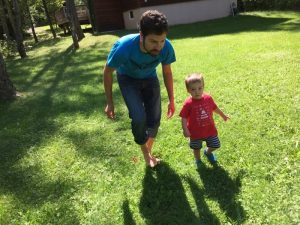
It might help to do a little practice at a familiar ground before you head out camping. You can set up in your backyard or living room where your kid can experience a practiced form of camping before you leave. Try this and watch how they get used to it.
READ: 12 Backyard Camping Ideas Your Family Will Love
3. Pack the Essentials
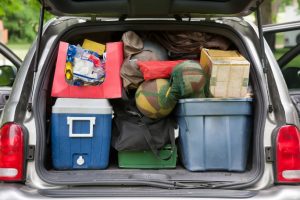
You would not enjoy being stranded in the bid to get diapers or other necessities while in camp, some camps are close to grocery stores so you might get lucky to find supplies. But some do not so it is better to buy and stock whatever you need before you set off. Here is a list of items to get:
- Pack ‘n’ play: While you pack your tent, add your kid’s pack ‘n’ play. It includes a playpen and a bed for your little one to sleep in, it helps to prevent them from wandering off too, and they get to watch you while you do whatever you need to do.
- Blanket: If your child still crawls, this would be helpful include on days you need to cool down at the beach or around a campfire, be watchful, so they don’t wander off.
- Food: According to the mom at Bean Sprout Notes, You can get cheerios in small packs, applesauce, and fruit cups. It is excellent to keep the children well-fed to avoid irritation, and she also suggested formula meals instead of milk which requires ice for preservation formulas that require less attention, so it is more advisable to opt for at this point.
- High chairs might help when you serve food
- Toys, plastic books, bringing your kid’s favorite toys, and stuffed animals will help keep them occupied while you are on this trip.
- Backpack or front baby strapper: If you would go hiking, it is wise to take along a carrier with safety harnesses to put your kid in when moving.
- Water bottle: Your kid might get thirsty.
- Long-sleeved shirts and trousers: We know you will pack clothes but do not forget the long types; you never know if there will be bugs or insects flying around.
Other items you can get includes:
- Sunscreen: Children of 6 months and above can use sunscreen.
- Shade: Get a beach umbrella to prevent the rays of the sun while they nap outside.
- First-aid kit: Nothing to worry about, just some bandages and rubbing alcohol.
- Bug-net: Since it isn’t advisable to use bug repellants on infants, it is best to use some netting to shield your child from being pestered on by bugs.
- Trash bags: If you are staying at a site where you have to get rid of your trash yourself, especially the diapers. It is best to get some smell-contained plastic bag to store used diapers.
- Safety jackets: If your camp activities include a boat ride, bring along an infant size jacket. Bringing along your infant for a boat ride might soothe and calm them. You will want them protected as some camps do not provide jackets for infants.
- Wet wipes
SEE: 16 Camping Essentials for Kids
4. Ask For Help
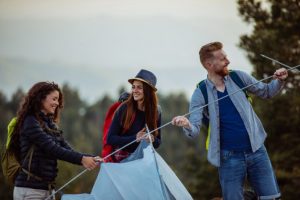
It is possible that you would deal with two kids at a time like an infant or toddler coupled with the number of supplies you are going with. Alex Hutchinson of Todaysparent suggests it might be easier to go along with someone willing to help like grandparents, uncles, or aunts. It helps reduce the burden. Please remember that they are only there to help so avoid dumping all the work and diaper change on them. If you are daring enough to go on a month-long trip, you can rent beasts of burden to help you with your supplies.
5. Hit the Road ASAP
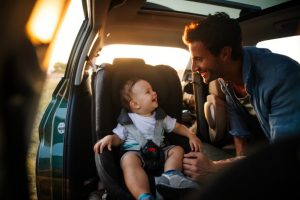
Now that you have made necessary preparations, got the items needed, you are ready to leave for the camp. Remember that kids get anxious or moody in new environments, but you can ease their behavior by showing enthusiasm. They catch up and match your happiness.
Most times, we plan, but certain situations still happen, but that is normal. Do not panic if sleeping patterns change or someone gets a bruise this only helps you with experience as you would know what parts to touch on your next camping trip.
Ensure to leave on time no matter how short the distance is, this would give you enough time to get familiar with the site and be able to set up things on time.
CONCLUSION
You would agree with me that parenting is an adventure filled with learning new things each day. Take this camping trip as an avenue to learn and have fun. After reading this article, you now know the things to do when going camping with a one year old. Also, you should know the purpose of your trip and how to work around it, things to expect at the campsite the items and essentials to take along. You should also try to practice with your infant before leaving the house, ask for companions from your family, and know to leave on time.
It is fine to get to the camping ground early and familiarise yourself with the environment so you know where to avoid it because of your infant. If your kid is still sleep-training, and you sleep in tents it might be great to inform your camp neighbors of any disturbances. So you don’t ruin their trip or try to pacify your kid by covering the tents with blankets to shield away from the rays of light at dawn. I wish you and your little one a splendid camping trip.


